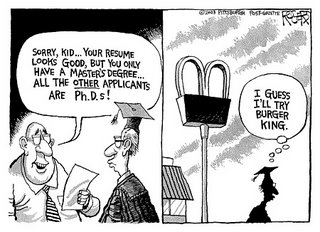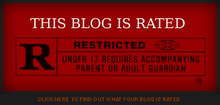********************
Warning: Whininess about to ensue. Full throttle nudity, as well, as I strip myself down to the core and make myself vulnerable to the loyal and/or erstwhile few who either read this blog as a way of passing time or who stumbled here by accident.
Caution: LONG blog entry.
So, as many of you know, I've been jobless since March and trying to find "the next great thing" ever since. What the TNGT is, I haven't a clue. It would seem my "career" trajectory has been in a slow, downward tailspin ever since I thought it would be a good idea to leave San Francisco and come back to Washington, D.C.
Let's review, shall we?
In 1995, I graduate from George Mason University—just another one of thouands with a largely useless liberal arts degree—and move to California to pursue a master's degree at a private religious consortium.
In 1996, I discover that living on student loans is horrifyingly unacceptable and decide I should get a job and go to school full time. I acquire said job as an editorial intern for a socially progressive trade publisher and begin working my way up the ladder of responsibility and pay. (Starting salary: $28,000.)
Zoom ahead to 2001: I'm now successfully working as managing editor of books and special projects for a trade publisher that covers the pulp and paper industry. A yawner, I know, but I can not only get the books off press on time, I can also explain the mechanics of a fourdrinier paper machine and a host of paper end products ranging from kraft paper to corrugated medium to toilet paper to your average lay person. (Salary: 56% increase over starting base pay; promotions: four in six years.)
In 2002, I accept a job as a policy manager at the trade association for the paper industry. Headquartered in Washington, D.C., I (insert adverb) leave San Francisco and return to the East Coast. I take the job for two reasons and two reasons only: first, to build my resume/work experience/knowledge base and, second, to increase my salary. I do not—with an emphasis on NOT—come to Washington with delusions of grandeur or intentions of changing/saving/radically transforming the world like so many of the masses who flock to Capitol Hill each year. I come to learn and make money, straight up. (Starting salary: 15% increase over previous salary.)
I maneuver clumsily through the politics of said conservative organization, but eventually manage to stay on the proverbial horse and learn and write lots and lots of talking points about why recycling paper is important. I also engage in a little fund raising, bridge building, and event coordination. I begin to draw up a career plan: learn all I can about the environmental virtues of recycling and sustainability and begin looking for a job with a corporation doing enviro, greeny stuff.
Around the end of 2004, I get kicked to the curb because there are three of us doing the same thing and one of us has to go. We can't fire the director because said director is the important cog in the trifeca and the admin makes less than I do, so I draw the short straw. (Departing salary: 7% increase over previous salary.)
Strike one to career plan.
Skip ahead a few weeks: I interview with a HUGE multi-national corporate conglomerate with offices in the only southern city east of the Mississippi of cultural consequence at the moment. They like me but forget to get back to me. When they finally do, it's only after being prodded by one of the non-profits they support and I work with. They tell me they’ve decided to go with an internal candidate instead. Foul ball/ball one to career plan.
Skip ahead a couple of months: I'm in the office of an itty bitty, teensy weensy, yellow polka dot bikini non-profit that advocates for recycling. Same said non-profit is one of the organizations for which I've raised money and with which I've built bridges. We--the executive director and I--decide I should become fund development director because a) I'm highly organized and detail oriented, b) she's overwhelmed and needs someone to pick up the slack with sponsors, and c) because I “get” what IBTWYPDB non-profit is about and I'm good at organizing high level, corporate/executive events. I agree to deviate from my career plan, recognizing that this job will actually put me in touch with the kind of people at corporations where I want my next job. The only reason I take this job: so I can network and get the next job in two years or so. (Starting salary: 4% over previous salary with a $10K bonus.)
In 2005, previously enamored executive director kicks me to the curb and pins failure to meet fund development goals fully and unashamedly on my chest (a topic for a whole other blog) while failing to acknowledge her own role in failed plan. (Departing severance: $0 and none of the bonus, of which I’m entitled to at least half, since I met 50% of the fund development goals and I know the company underwriting my position has paid the bonus. That last point, by the way, is a violation of all that is holy in fund development. When a company/foundation gives money and it's not used for its original, stated intention, the receiver/non-profit is suppose to give it back or talk to the giver about what to do differently. I have a strong suspicion said discussion never took place between receiver and giver. But again, a subject for another blog.)
Strike two to my career plan. (Note to self: Modify hitting stance and decide to look at opportunities in addition to enviro, greeny stuff.)
Gaily skip along to October. I’ve long-weeks-ago jettisoned my original career plan, deciding I want nothing to do with recycling or sustainability because they’re just words anyway and I’m done with that heady jazz. I just want to get down to work and wrap my hands around a project. I decide to get back to what I started in and was really good at: publishing.
So, I start to pursue that vein and I even land an interview with a publishing firm in the D.C./Metro area where the executive suites are fully occupied by the same folks who used to lead the company I worked for in San Francisco. I even meet with the VP of HR who goes to bat for me within the company. I interview for a position as managing editor for a trade pub that writes about non-fixed wing aircraft. They’re desperate for someone to get them back on track. They need someone to enforce and police deadlines. They want someone who can make their magazine shine and comply with style guides. They’re looking for somebody who can write and contribute content. The pay is significantly less than my previous jobs, but I'm willing to take a cut in pay to get back into publishing.
I’m doing the “I’m going to wet my pants I’m so excited” dance over in the corner with my hand raised saying, “Pick me! Pick me!” Thinking I'm on the upswing, I then get an email several weeks ago from the aforementioned VP of HR who tells me that all the editors who are Desperately Seeking a Managing Editor are fixated on finding an editor who has “industry experience and knowledge” who can write about whirly birds and whirly gigs right out the gate. Screw deadlines. Style guides be damned. They want a writer, not a manager. Or, they want a writer who will feign managing.
Strike three.
And I’m left standing in the corner thinking, “Fudge balls! Fudgity, fudgity, fudgity, fudge balls.”
So, dear readers, what would you advise?
I really want to work in publishing again. (Hell, let's face it: I really just want to work again.)
I have a reputation for getting the job done.
I have a reputation for grasping concepts and ideas quickly and being able to assimilate and explain those concepts and ideas so seasoned professionals and lay people alike understand and don’t feel talked down to or talked over.
What do I have to do to land a job in publishing where I’ll not only prove I can get your magazine/newsletter/website/book/blog/ whatever your media is off press on time, on budget, and looking good, but where I can contribute content to said medium of choice after a short learning period?
Help, oh wise ones.
Okay, whining over.
To see my resume, go to this site: Kincaid & Associates. Or click on November 29's blog entry and read on. Please ignore what I’m doing now. I am doing that stuff, but only as a placeholder. A girl has to eat. (Or, in my case, pay the mortgage, car payment, insurance, student loans, utility bills, gas, groceries….)




3 comments:
Janet, you have no idea how bad I wish I had contacts in the publishing world right now.
Have you tried any foreign (translate: Austrian) publishing companies?? I think my host dad was in a publishing company in Vienna. Not sure.
Hang tough...
Have you ever thought about Grant Writing in the Education Field? It's a big thing...big, big thing...Connections Academy (Brad's former employer) is based on Baltimore, MD. and K12 (who he interviewed with in June) is based in VA - where did we go again? Grant writing for education here in AZ, is much needed, great niche...I'm sure it's the same everywhere. Or are you just involved with green stuff? That made a lot of sense, right?
SML: Thanks, Lisa! I've thought about work in Europe, but the labor laws make it awfully complicated. I'm just going to keep plowing through Craigs List and all the other job sites.
Kim: Most grant writing involves working for non-profits or government agencies (like schools.) Having tried my hand at non-profits and been burned, I'm not at all interested in working directly for a non-profit again. I've done work for a couple of non-profits on the side, but as they had no funding, most of my work has been pro bono. If I were to continue in grants, I'd want it to be on the foundation side, awarding the grants. Begging for your keep sucks and the pay is crap and the leadership is often even crappier.
Post a Comment